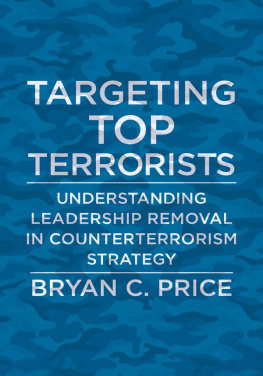
Leadership Decapitation
STRATEGIC TARGETING OF TERRORIST ORGANIZATIONS
Jenna Jordan
STANFORD UNIVERSITY PRESS
Stanford, California
Stanford University Press
Stanford, California
2019 by the Board of Trustees of the Leland Stanford Junior University. All rights reserved.
No part of this book may be reproduced or transmitted in any form or by any means, electronic or mechanical, including photocopying and recording, or in any information storage or retrieval system without the prior written permission of Stanford University Press.
Printed in the United States of America on acid-free, archival-quality paper
Library of Congress Cataloging-in-Publication Data
Names: Jordan, Jenna (Jennifer Elaine), author.
Title: Leadership decapitation ; strategic targeting of terrorist organizations / Jenna Jordan.
Other titles: Violence and terror (Stanford, Calif.)
Description: Stanford, California : Stanford University Press, 2019. | Series: Sudies in violence and terror | Includes bibliographical references and index.
Identifiers: LCCN 2019009121 (print) | LCCN 2019011745 (ebook) | ISBN 9781503608245 (cloth ; alk. paper) | ISBN 9781503610675 (ebook)
Subjects: LCSH: TerrorismPrevention.
Classification: LCC HV6431 .J674 2019 (print) | LCC HV6431 (ebook) | DDC 363.325/16dc23
LC record available at https://lccn.loc.gov/2019009121
LC ebook record available at https://lccn.loc.gov/2019011745
Cover design: Andrew Brozyna
Typeset by Newgen in BemboAR Rmnosf 10/13.5 Points
Contents
Acknowledgments
I could not have completed this book without the support and guidance of so many wonderful people. It is with great pleasure that I have the opportunity to thank them here. Robert Pape inspired me to study terrorism and guided me in the development of this project. Bob helped me to grow as an academic, and his support was unwavering. He was patient, encouraging, and above all, he taught me to believe in myself. I would also like to thank John Mearsheimer who taught me to think critically, ask clear questions, and realize my value as an academic. Charles Lipson provided wonderful support and excellent comments on all stages of the project. Charles Glaser encouraged me think critically and analytically. It is from Bob, John, Charles, and Charlie that I developed a passion for International Relations. I also want to thank Mia Bloom, who has been a wonderful mentor and true friend. She has encouraged and supported me in so many ways. She helped me through periods of doubt and struggle in completing this manuscript, while offering constant feedback and unending friendship. From Mia I have learned that academic research can truly have real-world implications.
I am profoundly grateful to all of my friends and colleagues for comments and on this project. At the University of Chicago, I was very lucky to have developed a rigorous and supportive community. I would like to thank Zeynep Bulutgil, Jon Caverley, Alex Downes, Anne Harrington, Anne Holthoefer, Matt Kocher, Adria Lawrence, Chad Levinson, Jennifer London, Chris MacIntosh, Emily Meierding, Michelle Murray, Nuno Monteiro, Harris Mylonas, Sebastian Rosato, John Schuessler, Duncan Snidal, Frank Smith, Keven Ruby, Lora Viola, and Joel Westra. They asked hard questions and gave great advice. A special thanks to Jennifer London for editing anything and everything. Kathy Anderson facilitated the entire process and helped me to navigate along the way.
I have been fortunate to have a supportive academic community. My colleagues at the Sam Nunn School of International Affairs at the Georgia Institute of TechnologyAnjali Bohlken, Mariel Borowitz, Scott Brown, Alberto Fuentes, Claire Greenstein, Maggie Kosal, Dalton Lin, Mike Salomone, and Adam Stulberghave all provided invaluable feedback on this project. I am particularly appreciative for many long conversations with Larry Rubin and Rachel Whitlark, who read numerous drafts and offered extensive comments. Vince Pedicino and Marilu Suarez have helped me endlessly. I would also like to thank Victor Asal, Steven Barela, Risa Brooks, Shana Cohen, Julie Chernov, Martha Crenshaw, Audrey Kurth Cronin, Christine Fair, Michael Freeman, Mohammed Hafez, Patrick Johnston, Michael Kenney, Peter Krause, Avery Plaw, Bryan Price, Jacob Shapiro, Jim Walsh, Brian Williams, and Will Moore who all offered feedback and helpful suggestions that have had an important impact on my research. Their research has inspired me and shaped my thinking about this topic. My apologies to those I have forgotten to mention.
I am thankful for the amazing students at Georgia Tech. I could not have completed the research for this book without help from my incredible research assistants, Dan Brady, Elizabeth Clark, Zale Clay, Noah Crafts, Elizabeth Cupido, Sarah Drummond, Nathan Fisher, Amy Hartman, Grainne Hutton, John Krzyzaniak, Yuanyuan Lin, Jash Padhiar, Zack Shephard, Will Thomas, Bryn Thornburgh, Jesse Turcotte, and Tammy VuPham.
I received generous financial and institutional support from the Smith Richardson Foundation, the University of Chicago, and the Ivan Allen College of Liberal Arts at the Georgia Institute of Technology. These generous contributions afforded me the time and resources necessary to complete this project. I would also like to thank Ethan Bueno de Mesquita at the Harris School of Public Policy Studies at the University of Chicago for offering me a research position. It was a rich learning experience, and it allowed me the time to research and write.
I have also been fortunate to have presented this research at the Program on International Politics, Economics, and Security and the Program on International Security Policy at the University of Chicago, the Triangle Institute for Security Studies, the MIT Security Studies Program, the Institute for Security and Conflict Studies at George Washington University, the University of Notre Dame, the International Center for the Study of Terrorism at Pennsylvania State University, Emory University, and the Atlanta International Club. I am thankful for the participants at these workshops and seminars who provided me with excellent and helpful suggestions, challenging questions, and critical feedback. I thank the anonymous reviews who provided valuable feedback on the manuscript. I am indebted to editor Alan Harvey and assistant editor Leah Pennylark for the opportunity to publish this book. They were extremely patient and instrumental in helping me finish this process.
Finally, I owe an enormous amount of gratitude to my family. Jenirose Friedkin, my sister and best friend, can always bolster my confidence and make me laugh. Her puns give me life. She has been there for me always, unconditionally. Rob Campbell has been a constant source of support. He has tirelessly listened to many complaints and endless iterations of this book over the years, offering good advice and a critical eye. His help and care has allowed me the opportunity to research, write, and teach. I would not have been able to finish this without him. A special thanks to John and Ruth Campbell for their love and support, and for never asking me why this has taken so long. Conversations with John provided the foundation for this books theoretical framework. He has read countless drafts, edited my writing, and offered sage advice throughout the years. John has made my thinking, theories, and research sharper and more focused. I would also like to express my love and thanks to Adrienne Erlick and Lowell Sigmund, who kept me laughing and traveling all along the way. I profoundly thank my father, David Jordan, for his unconditional love, encouragement, advice, and support. He has taught me independence, acceptance, and how to believe in myself and others. The memory of my mother, Beverly Jordan, inspires me daily to be a better person. Finally, I dedicate this book to my son Isaiah, who has had to hear a lot about terrorism. His positivity inspires me daily. He has brought so much joy and love to my life, and for that, I am most grateful.
Next page







